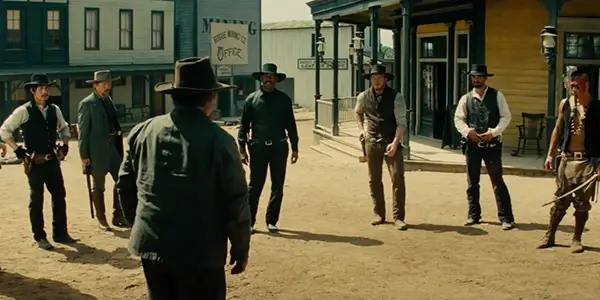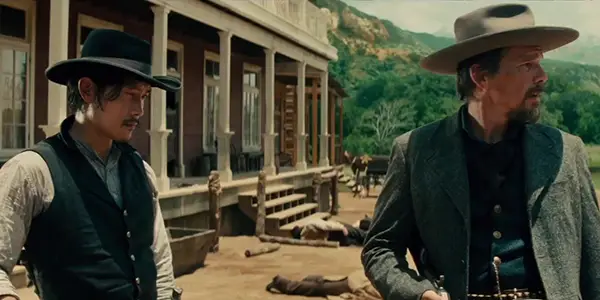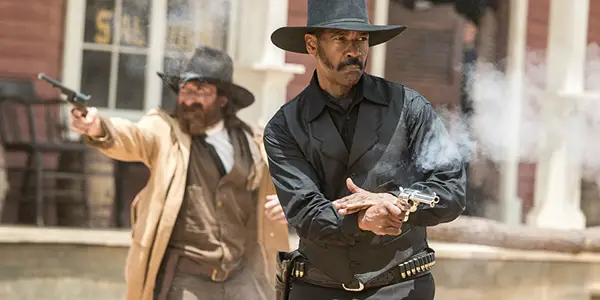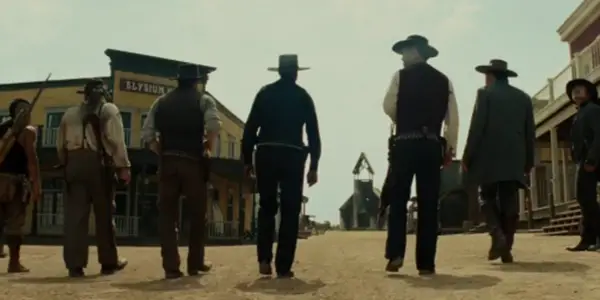THE MAGNIFICENT SEVEN: A Generic Remake Despite A Diverse & Talented Cast

David is a film aficionado from Colchester, Connecticut. He enjoys…
Hollywood seems to be stuck in an age of remakes and sequels. Though original films do exist, they are never as popular or successful as the large-scale blockbusters, which are the only sure moneymakers for studios. Coming from this standpoint, it’s no surprise that Antoine Fuqua‘s The Magnificent Seven exists.
It’s unfortunate that this was the film which Hollywood chose to remake, though, since John Sturges’ 1960 version is itself a remake of Akira Kurosawa‘s Seven Samurai. To translate a Japanese samurai story into a Western during the prime of the genre is one thing, but to then modernize that remake into the present era is another entirely. What occurs as a result is a film that, while occasionally enjoyable, is lacking in the ideas and complexities that imbued both of the original films from which it originated. It is a film very much lost in translation.
A Remake of a Remake
The Magnificent Seven, much like both the original and Kurosawa‘s film, consists of a group of warriors who come together in order to protect a small town from a gang of outlaws. Here, it is the mining town of Rose Creek, which has recently been invaded by an industrialist named Bartholomew Bogue (an eeriely stoic Peter Sarsgaard), who wishes to dispel the town’s inhabitants in order to reap the rewards of the mines for himself. After shooting some of the townspeople as a warning, he leaves, giving them three weeks to pack up and go.

Rather than surrender to Bogue’s wishes, though, town inhabitant Emma Cullen (Haley Bennett) decides to put up a defense, coming in the form of hiring an army. After a lengthy search, they find seven distinguished individuals: bounty hunter Sam Chisolm (Denzel Washington), gambler Josh Faraday (Chris Pratt), Mexican outlaw Vasquez (Manuel Garcia-Rulfo), sharpshooter Goodnight Robicheaux (Ethan Hawke), knife-wielding assassin Billy Rocks (Byung-hun Lee), tracker and fur trader Jack Horne (Vincent D’Onofrio), and Comanche warrior Red Harvest (Martin Sensmeier).
The most obvious distinction about this group of individuals as opposed to the original The Magnificent Seven is their diversity. Among them, whites are actually the minority, with only three out of the seven roles. Not only is an African-American the head of the group, but an Asian, Native American, and Mexican make up the others. In addition to this diversity within the Seven, there is an enhanced gender role in the form of Emma Cullen, played by Bennett, who is the first to hire Chisolm and also refuses to be held down by the traditional women role for the time.
The decision to include a diverse cast is one that works both for and against The Magnificent Seven. The enhancement to roles for both minorities and women makes the film feel very much like a modernized version of the original story (although it should be noted that director Antoine Fuqua considered the elevated parts to actually be more realistic to the times). Whether or not this is the case, it’s an honorable choice by the filmmakers, especially now, when such events as the #OscarsSoWhite controversy occurred earlier this year and there is an overall post-modern look at gender and race identities in film.
The issue here is not necessarily the choice to have a diverse cast, then, it’s what the film fails to capture within each individual role. The diversity of each member, with the possible exception of Comanche Warrior Red Harvest, never seems to come into play or have any relevance within the story itself. Much of the gathering together of the Seven at the start of the film feels rushed and artificial; each of them don’t even seem to think twice about joining for an almost certainly hopeless cause from initial outlook.

For example, when Byung-hun Lee‘s Billy Rocks is roped into the fight, there doesn’t seem to be any reluctance or reasoning behind his choice. He simply joins because he is attached at the hip to Ethan Hawke‘s Goodnight, and his background has no bearing on why he makes the decision. With such diversity amongst a group that will only be successful if they work together, you would think that Fuqua would expand upon this potentially intriguing idea. Yet, because each character is so underwritten, the diversity feels more like a ploy to attract a wider audience as opposed to feeling organically driven within the story.
The Seven
The performances within The Magnificent Seven, though, are potentially the film’s saving grace. The highlight for most people will likely be Denzel Washington. Strong and charismatic, this is one of his more entertaining roles, although the lack of character moments other than impressive gun-shooting doesn’t really give him an opportunity to show his full acting range, at least when compared to other roles (2012’s Flight, for instance).
Better, then, is Vincent D’Onofrio as fur trader Jack Horne. In true method acting style, D’Onofrio never breaks from an unusually shrill voice which in no way seems to match his robust figure, yet somehow the contrast suits him.
It’s unfortunate, though, that both Ethan Hawke and Chris Pratt seem out of place in a Western. With little distinction to either their mannerisms or accents, I couldn’t quite see them as more than just characters they have played in the past. The film also doesn’t quite know what to do with Pratt. There is an attempt to make him the youthful, reckless character much like the similar one from both the original film and Seven Samurai, yet he is also presented as a mature and developed gunslinger, much like Steve McQueen in the 1960’s version.
Byung-hun Lee is mostly wasted in the film, with little dialogue, while Manuel Garcia-Rulfo aptly (yet sparingly) plays a character that feels much like he was pulled straight out of the old West. Easily the most memorable character of the bunch, though, is Comanche warrior Red Harvest, played by Martin Sensmeier, who receives the best introduction (and some of the film’s more riveting moments overall). He arrives on the scene last and, through a tense and gorgeously shot conversation with Chisolm, is warmly welcomed as one of the group.

Though I enjoyed the cast as a whole, as mentioned, they are mostly wasted by a story that doesn’t develop them in the requisite way, either individually or as a group, and it’s not even helped with Nic Pizzolato‘s co-writing of the screenplay. An example is the aforementioned Red Harvest who, after being introduced, is little-seen or heard from for the remainder of the film, at least until the action scenes. As a result of this underdevelopment for both him and the other members of the group, the action which inevitably follows holds little emotive weight behind it.
Violence and Action
The reason that few of The Magnificent Seven‘s characters stand out is mostly due to Antoine Fuqua‘s desire to embellish the film with lengthy, grandiose action sequences. There is one minor battle at the town between the Seven and some of the initial antagonists, but it is the final battle that never seems to end. Interestingly, Fuqua‘s film is only five minutes longer than the original, yet it feels much longer.
In the original The Magnificent Seven and in many Westerns in general, the action scenes come in shifts. There will be a battle, then an interlude to catch your breath, followed by another fight scene; and this cycle continues for much of the film’s length. Here, though, it is all build-up, followed by non-stop action all the way to the film’s conclusion. It makes the film seem much like Quentin Tarantino‘s Django Unchained, which is also mostly action-less until its latter third. Fuqua is no Tarantino, though, and his attempts at slow-burning the action until the conclusion are very much in vain.

A further distinction between this film and the original is the glorification of the violence at its core. In the original The Magnificent Seven, the idea imposed by the film is that these are seven heroes who only shoot their guns out of necessity. There are even several chances during which they attempt to back down and reduced the amount of unnecessary killing, seen in the hesitation to start the full-out war at the film’s conclusion.
Yet, the final battle of Fuqua‘s film comes without anyone trying to stop the bloodshed; the army of bad guys come riding into town and then explosions and gunfire rapidly ensue. The noise from these scenes can also, at times, be quite deafening to the ears. Though Fuqua has proven that he is at least a suitably efficient director of action, much of it becomes forgettable, mostly due to his reluctance to show restraint.
James Horner‘s soundtrack in these final scenes, his last before his untimely death, is exuberant and lively (though also occasionally disruptive). Pay particular attention to the final few moments, when he even blends the original theme of The Magnificent Seven into the mix.
Conclusion
To conclude, Antoine Fuqua‘s The Magnificent Seven is a decently entertaining action flick on its own merits, yet it also lacks the sophistication and character that both the original film and Akira Kurosawa‘s thrived on. Due to Fuqua‘s decision to focus almost exclusively on explosion-ridden action as opposed to the believable building of characters, much of the action lacks the required connection to the characters themselves. As a result, even when characters fall to their demise, it brings little emotional response.
Though the diversified cast behind the making of the film should be celebrated, and, in addition, some of them give strong performances given what they were handed, there is unfortunately not enough of a focus on their initial motivations or of their purpose within the group. Therefore, the added element of diversity seems tacked on as opposed to being integrated within the story.
In the end, The Magnificent Seven is unlikely to be memorialized in the same manner as the two films which preceded it. It has few standout moments and, in addition, doesn’t have anything too deep or thought-provoking to say. Yet, if you simply wish to see a gun-slinging Western with some of your favorite actors, it’s a least a passable couple hours at the movies.
What is your favorite modern remake?
The Magnificent Seven is now open in US and UK theaters. Find international release dates here.
Does content like this matter to you?
Become a Member and support film journalism. Unlock access to all of Film Inquiry`s great articles. Join a community of like-minded readers who are passionate about cinema - get access to our private members Network, give back to independent filmmakers, and more.
David is a film aficionado from Colchester, Connecticut. He enjoys writing, reading, analyzing, and of course, watching movies. His favorite genres are westerns, crime dramas, horror, and sci-fis. He also enjoys binge-watching TV shows on Netflix.













